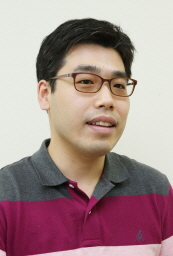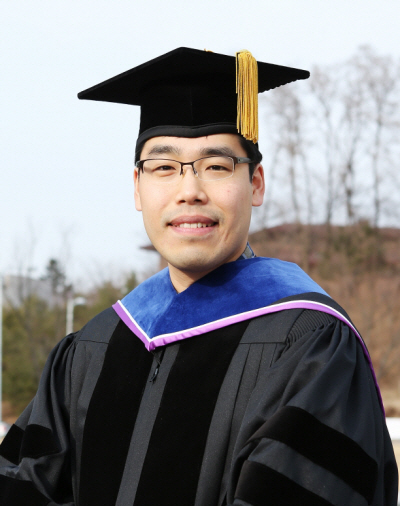MSU
-
 KAIST Hosts the Wearable Computer Contest 2015
Deadlines for Prototype Contest by May 30, 2015 and August 15 for Idea Contest
KAIST will hold the Wearable Computer Contest 2015 in November, which will be sponsored by Samsung Electronics Co., Ltd.
Wearable computers have emerged as next-generation mobile devices, and are gaining more popularity with the growth of the Internet of Things. KAIST has introduced wearable devices such as K-Glass 2, a smart glass with augmented reality embedded. The Glass also works on commands by blinking eyes.
This year’s contest with the theme of “Wearable Computers for Internet of Things” is divided into two parts: the Prototype Competition and Idea Contest.
With the fusion of information technology (IT) and fashion, contestants are encouraged to submit prototypes of their ideas by May 30, 2015. The ten teams that make it to the finals will receive a wearable computer platform and Human-Computer Interaction (HCI) education, along with a prize of USD 1,000 for prototype production costs. The winner of the Prototype Contest will receive a prize of USD 5,000 and an award from the Minister of Science, ICT and Future Planning (MSIP) of the Republic of Korea.
In the Idea Contest, posters containing ideas and concepts of wearable devices should be submitted by August 15, 2015. The teams that make it to the finals will have to display a life-size mockup in the final stage. The winner of the contest will receive a prize of USD 1,000 and an award from the Minister of MSIP.
Any undergraduate or graduate student in Korea can enter the Prototype Competition and anyone can participate in the Idea Contest.
The chairman of the event, Hoi-Jun Yoo, a professor of the Department of Electrical Engineering at KAIST, noted:
“There is a growing interest in wearable computers in the industry. I can easily envisage that there will be a new IT world where wearable computers are integrated into the Internet of Things, healthcare, and smart homes.”
More information on the contest can be found online at http://www.ufcom.org.
Picture: Finalists in the last year’s contest
2015.05.11 View 8993
KAIST Hosts the Wearable Computer Contest 2015
Deadlines for Prototype Contest by May 30, 2015 and August 15 for Idea Contest
KAIST will hold the Wearable Computer Contest 2015 in November, which will be sponsored by Samsung Electronics Co., Ltd.
Wearable computers have emerged as next-generation mobile devices, and are gaining more popularity with the growth of the Internet of Things. KAIST has introduced wearable devices such as K-Glass 2, a smart glass with augmented reality embedded. The Glass also works on commands by blinking eyes.
This year’s contest with the theme of “Wearable Computers for Internet of Things” is divided into two parts: the Prototype Competition and Idea Contest.
With the fusion of information technology (IT) and fashion, contestants are encouraged to submit prototypes of their ideas by May 30, 2015. The ten teams that make it to the finals will receive a wearable computer platform and Human-Computer Interaction (HCI) education, along with a prize of USD 1,000 for prototype production costs. The winner of the Prototype Contest will receive a prize of USD 5,000 and an award from the Minister of Science, ICT and Future Planning (MSIP) of the Republic of Korea.
In the Idea Contest, posters containing ideas and concepts of wearable devices should be submitted by August 15, 2015. The teams that make it to the finals will have to display a life-size mockup in the final stage. The winner of the contest will receive a prize of USD 1,000 and an award from the Minister of MSIP.
Any undergraduate or graduate student in Korea can enter the Prototype Competition and anyone can participate in the Idea Contest.
The chairman of the event, Hoi-Jun Yoo, a professor of the Department of Electrical Engineering at KAIST, noted:
“There is a growing interest in wearable computers in the industry. I can easily envisage that there will be a new IT world where wearable computers are integrated into the Internet of Things, healthcare, and smart homes.”
More information on the contest can be found online at http://www.ufcom.org.
Picture: Finalists in the last year’s contest
2015.05.11 View 8993 -
 KAIST's graduate, the first Ph.D. holder in games, is appointed professor at Michigan State University in East Lansing
Dr. Tae-Woo Park
The academic community recognizes the study in games as a field for research
Dr. Tae-Woo Park, a graduate of KAIST, has been appointed a professor at Michigan State University (MSU) in East Lansing. He will start working in August at the Department of Telecommunications, Information Studies, and Media, the College of Communications Arts, MSU.
Dr. Park received a doctoral degree in games, the first of its kind in KAIST. His research focus is game design, research, and development.
Dr. Park has strived to enhance user experience by incorporating various aspects of everyday life into games and made efforts to introduce measures limiting or preventing game addiction, a major concern among young people in South Korea. Professor Joon-Hwa Song of Computer Science at KAIST, Dr. Park's advisor, commented that "KAIST graduates have been the main actors in the development of Korea's gaming industry. Our efforts to systemize the field of games into an academic discipline have been recognized through Dr. Park's appointment."
Dr. Park said that he plans "to apply mobile device and ubiquitous technology and develop games that will not only entertain users but also help them have a better life.”
2014.05.29 View 12579
KAIST's graduate, the first Ph.D. holder in games, is appointed professor at Michigan State University in East Lansing
Dr. Tae-Woo Park
The academic community recognizes the study in games as a field for research
Dr. Tae-Woo Park, a graduate of KAIST, has been appointed a professor at Michigan State University (MSU) in East Lansing. He will start working in August at the Department of Telecommunications, Information Studies, and Media, the College of Communications Arts, MSU.
Dr. Park received a doctoral degree in games, the first of its kind in KAIST. His research focus is game design, research, and development.
Dr. Park has strived to enhance user experience by incorporating various aspects of everyday life into games and made efforts to introduce measures limiting or preventing game addiction, a major concern among young people in South Korea. Professor Joon-Hwa Song of Computer Science at KAIST, Dr. Park's advisor, commented that "KAIST graduates have been the main actors in the development of Korea's gaming industry. Our efforts to systemize the field of games into an academic discipline have been recognized through Dr. Park's appointment."
Dr. Park said that he plans "to apply mobile device and ubiquitous technology and develop games that will not only entertain users but also help them have a better life.”
2014.05.29 View 12579 -
 A game enthusiast received a Ph.D. at the 2014 commencement
A high school student, who was addicted to video gaming and had barely managed to gain entrance to KAIST, became a star of its 2014 commencement ceremony.
The student was Tae-Woo Park who received his Ph.D. in games at 32 years of age.
Park entered KAIST in 2002 as an undergraduate student. However, owning to bad grades, he was not accepted to the graduate school of KAIST until 2006. He began playing games at the age of 7, which distracted him from his studies at an early age. Nevertheless, he was able to complete master’s degree after two and a half years, which normally takes two years for average students.
Professor Joon-Hwa Song saw a possibility from his student’s experience of producing and commercializing a mobile puzzle game while Park was working as a president of the game club, HAJE, at KAIST. Professor Song advised him to take the advantage of his interests and try developing game platforms and contents. Park decided to develop a game that could help others and would change people’s negative views of games. He created a whole new generation of games.
In order to find ideas for games that can be easily enjoyed in daily lives, Park went to numerous gyms, swimming pools, daycare centers, and parks to analyze people’s behaviors and discussed with his colleagues who were also interested in games. During this process, the experience of organizing creative ideas through cooperation and discussions became a great foundation for his future research.
He observed some people quitting midway during a workout on treadmills because they were bored with working out alone. From this, Park embarked on developing a new style of game that allowed people to exercise together.
Park used the system on a treadmill, which recognizes the speed of the person running to automatically adjust the machine’s speed, to develop an interactive game platform for Swan Boat. The Swan Boat game is a race exercise game that adjusts the direction according to speed difference between two players. The game utilizes the difference of running speed between two people on treadmills to change the direction of the boat.
With the Swan Boat game, people can now play games and exercise at the same time. The technology also allows online access anywhere in the world, which means checking friends’ rankings at nearby gyms or homes, or even a World Gym Running Contest.
In addition, Park helped develop various next generation exercise games and life-based services, including the sparrow chirp application, which finds children that go astray, or an avatar game that utilizes the user’s daily life patterns. These results and papers attracted attention from international societies and have also won a number of awards.
Professor Song said, “There has been no precedent of receiving a Ph.D. at KAIST for developing games, however, Park’s case has given courage to many people that if you can create what is really required in everyday life, you can indeed receive a doctor’s degree.”
Park remarked, “I’d like to express my gratitude to my advisor, Professor Song, for giving me courage. I want to continue to make games that can help people’s lives in the future.”
Park will continue his work at the NASA Ames Research Center this June.
2014.02.27 View 11860
A game enthusiast received a Ph.D. at the 2014 commencement
A high school student, who was addicted to video gaming and had barely managed to gain entrance to KAIST, became a star of its 2014 commencement ceremony.
The student was Tae-Woo Park who received his Ph.D. in games at 32 years of age.
Park entered KAIST in 2002 as an undergraduate student. However, owning to bad grades, he was not accepted to the graduate school of KAIST until 2006. He began playing games at the age of 7, which distracted him from his studies at an early age. Nevertheless, he was able to complete master’s degree after two and a half years, which normally takes two years for average students.
Professor Joon-Hwa Song saw a possibility from his student’s experience of producing and commercializing a mobile puzzle game while Park was working as a president of the game club, HAJE, at KAIST. Professor Song advised him to take the advantage of his interests and try developing game platforms and contents. Park decided to develop a game that could help others and would change people’s negative views of games. He created a whole new generation of games.
In order to find ideas for games that can be easily enjoyed in daily lives, Park went to numerous gyms, swimming pools, daycare centers, and parks to analyze people’s behaviors and discussed with his colleagues who were also interested in games. During this process, the experience of organizing creative ideas through cooperation and discussions became a great foundation for his future research.
He observed some people quitting midway during a workout on treadmills because they were bored with working out alone. From this, Park embarked on developing a new style of game that allowed people to exercise together.
Park used the system on a treadmill, which recognizes the speed of the person running to automatically adjust the machine’s speed, to develop an interactive game platform for Swan Boat. The Swan Boat game is a race exercise game that adjusts the direction according to speed difference between two players. The game utilizes the difference of running speed between two people on treadmills to change the direction of the boat.
With the Swan Boat game, people can now play games and exercise at the same time. The technology also allows online access anywhere in the world, which means checking friends’ rankings at nearby gyms or homes, or even a World Gym Running Contest.
In addition, Park helped develop various next generation exercise games and life-based services, including the sparrow chirp application, which finds children that go astray, or an avatar game that utilizes the user’s daily life patterns. These results and papers attracted attention from international societies and have also won a number of awards.
Professor Song said, “There has been no precedent of receiving a Ph.D. at KAIST for developing games, however, Park’s case has given courage to many people that if you can create what is really required in everyday life, you can indeed receive a doctor’s degree.”
Park remarked, “I’d like to express my gratitude to my advisor, Professor Song, for giving me courage. I want to continue to make games that can help people’s lives in the future.”
Park will continue his work at the NASA Ames Research Center this June.
2014.02.27 View 11860